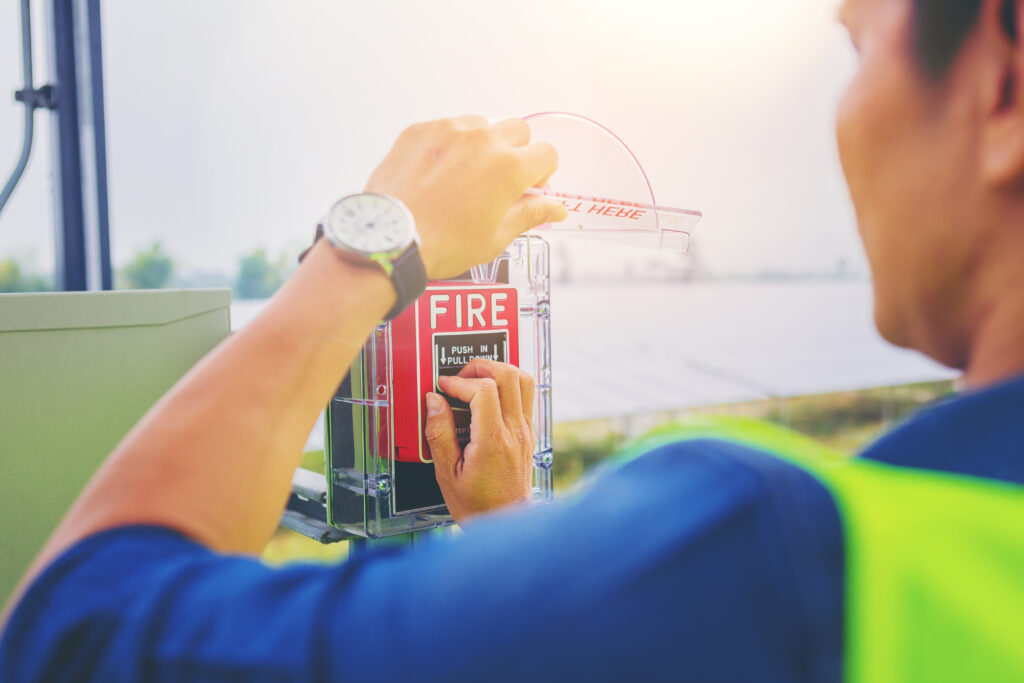
Fire alarm systems are one of the most critical life safety systems in any building. They work silently in the background — but when you need them, they must perform flawlessly. That’s why regular inspections are not optional; they’re required by NFPA 72, local fire marshals, and most insurance carriers.
Two of the most common inspection schedules are quarterly and annual inspections — but many facility managers and business owners aren’t sure what the difference is, or whether they need both. Let’s break it down.
The Basics: What Each Inspection Includes
Quarterly Fire Alarm Inspections
Quarterly inspections are performed four times a year, about every three months. The goal is to identify issues early and confirm the system is operational between annual tests.
A typical quarterly inspection includes:
- Looking at devices, like smoke detectors, pull stations, alarms, and control panels.
- Testing parts like notification devices, manual pull stations, and certain initiating devices.
- Checking batteries and the power supply to make sure backup power works.
- Reviewing the panel for trouble signals, supervisory alerts, and past events.
- Keeping records by writing a report for your files and to show you’re following the rules.
Quarterly checks are very important for facilities with:
- High occupancy buildings, such as schools, hospitals, and theaters.
- Places that run all day and night where it’s important to avoid downtime.
- Insurance or AHJ (Authority Having Jurisdiction) requirements that mandate quarterly testing.
Annual Fire Alarm Inspections
Annual inspections give a full test of the whole fire alarm setup, going beyond the regular checks done each quarter. You can see them as a close look at all parts of your fire alarm system.
A typical yearly inspection includes:
- Device Testing: Every smoke detector, pull station, heat detector, and duct detector is tested.
- System Activation: Notification devices such as horns, strobes, and speakers are tested through the whole building.
- Integration Tests: Checks are done on elevator recall, door release, HVAC shutdown, and monitoring .
- Compliance Report: A close report noting any problems and suggested fixes.
Annual inspections are often scheduled with the local fire marshal present, ensuring your facility meets NFPA 72 and local code compliance.
Why Both Inspections Matter
Depending only on yearly inspections carries some risk. Minor things, such as a smoke detector that needs cleaning or a device that’s not properly connected, might not be noticed for a long time. Quarterly inspections lets you find issues before they become violations or put occupants at risk.
Here’s how the two types of inspections compare:
| Inspection Type | Frequency | Scope | Goal |
| Quarterly | 4x per year | Partial device testing, power checks, panel review | Keep system operational & find issues early |
| Annual | 1x per year | 100% device testing, full integration, compliance report | Ensure full code compliance & readiness |
Who Should Have Regular Inspections?
- Schools and universities usually need them because of high occupancy. Local authorities often ask for these inspections.
- Businesses and offices should do them too. Inspections help keep things running smoothly and keep workers safe.
- Warehouses and factories need inspections to protect what they own and meet insurance rules.
- Hospitals and clinics often have even stricter inspection schedules, sometimes as often as monthly.
The Key Takeaway
Think of quarterly and yearly fire alarm inspections as a team. They have separate jobs, but together they ensure your system is reliable, follows regulations, and is prepared to protect people in your building.
Keeping up with both kinds of inspections can:
- Lower the chance of system failures during emergencies.
- Keep you from having to pay for code violations or re-inspections.
- Make building owners and occupants feel more secure.
Want to set up your next inspection?
Archis provides fire alarm inspection services on a quarterly, annual, or custom schedule for schools, businesses, and industrial buildings in Central Florida.
Call us today to set up your inspection, or ask for a free consultation so we can help you build a compliance calendar adjusted for your building’s needs.

